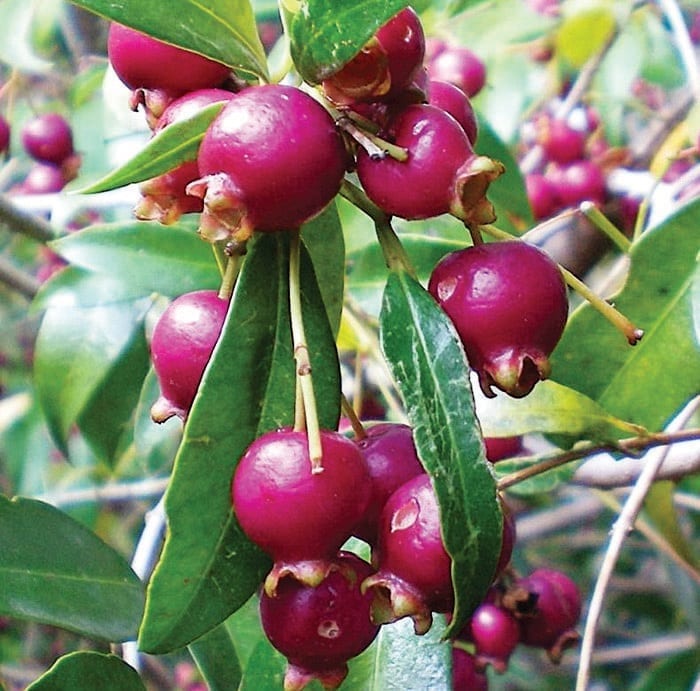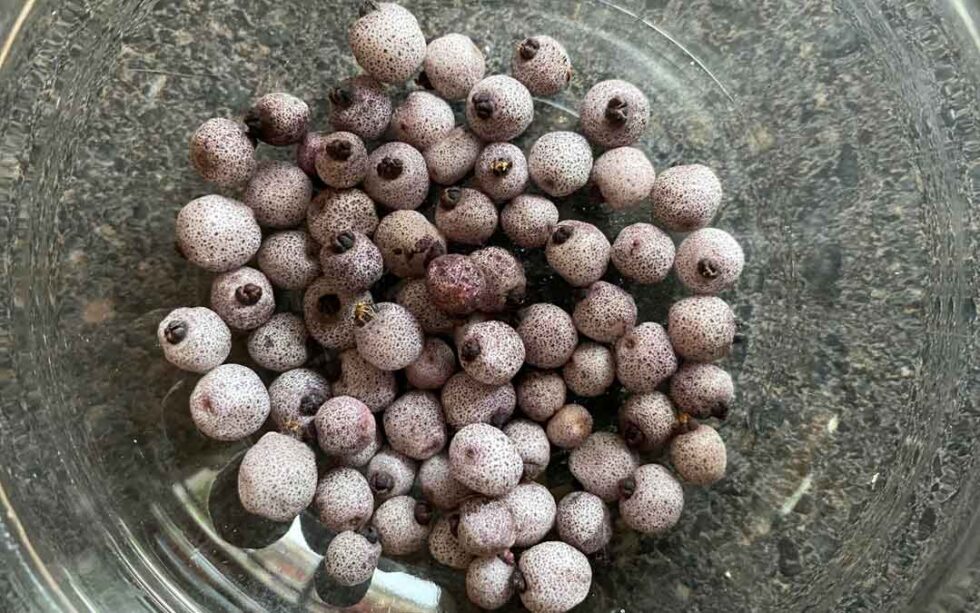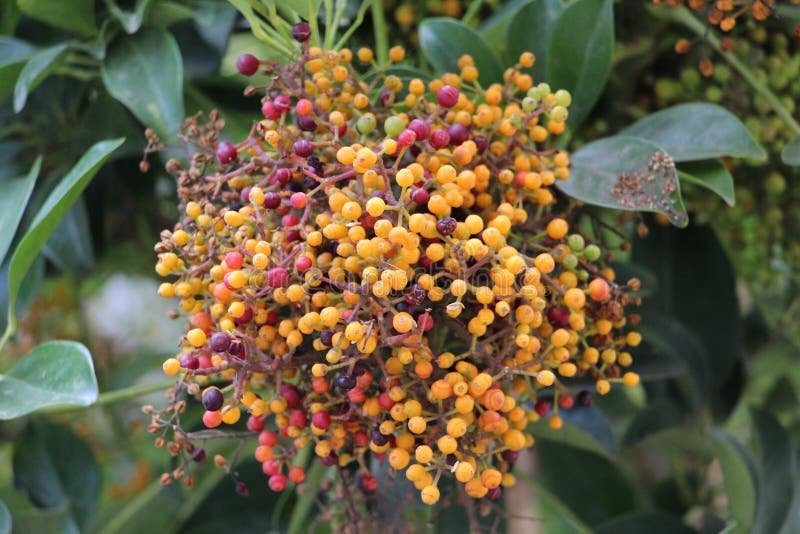
EDIBLE NATIVE PLANT LIST SUNSHINE COAST REGION Part 1 The Bribie Islander
The native finger lime is a small, thorny evergreen shrub, but its petite, oval (finger-shaped) fruit is tasty and rewarding to grow. Inside the skin are small, tangy beads of citrus pulp. This tree can be pruned and shaped. There are many named varieties with fruit with green, pink, red, yellow or orange tinged colours. Height: 2-7m; width: 2-5m.

Austromyrtus dulcis. Midyim Berry. A bush tucker plant that produces masses of pea sized fruit
Native edible plants include berries, grass seeds, plant roots, seeds, leaves and flowers. When eating bush foods, care must be taken to identify the plant correctly to ensure the plant is edible and to factor

Australian Native Lilly Pilly Berries
1. Native Rivermint Long used in Aboriginal culture as a flavoursome bushfood, insect repellant and medicinal herb, native rivermint can be used dried or fresh anywhere. 2. Midyim berries

PlantFiles Pictures Austromyrtus Hybrid, Midgen Berry 'Copper Tops' (Austromyrtus dulcis x
Wombat berry (Eustrephus latifolius) is an evergreen climbing or scrambling native Australian plant that can reach up to six metres into the tree canopy in ideal conditions. The tubers were eaten by various Indigenous people of Australia and have a mildly sweet, earthy taste.

A Guide To Bush Tucker Australia's Native Foods
Bush tucker, or bush food, is any food native to Australia. The Australian Aboriginals used the environment around them for generations, living off a diet high in protein, fibre, and micronutrients, and low in sugars. Much of the bush tucker eaten then is still available and eaten today. We guide you through it here. Food from Animals
Fruit & Vegetables Aussie Bush Tucker An Introduction to Common Native Foods of Australia
Pepper berry action is attributed largely to polygodial, a sesquiterpene dialdehyde which is present in other Australian native berries including Dorrigo pepper (Beattie, 2002). Polygodial is known to inhibit attachment of blue mussel larvae which leads to marine fouling (Ban, Singh, & Etoh, 2000).

Australian Native Plant Profile Wombat Berry (Eustrephus latifolius) Dengarden
Tucker Bush Cherry. A variant of the popular Lilly Pilly, the Tucker Bush Cherry is an Australian native that produces red berries. These edible berries can be added to jams, cakes, wines, or eaten fresh. The Tucker Bush Cherry can grow up to 4 metres high and has delicate white flowers that appear during the warmer months of the year.

Wombat berry is an evergreen vine native to Malanesia, the Pacific Islands and Nothern Australia
Syzygium Australe Lilly Pilly Lilly pillies are popular Australian natives that grow in a variety of conditions and soil types. They're commonly grown as hedges and make perfect screening plants. There are around 60 different Lilly Pilly varieties that are native to Australia and Southeast Asia.

Blue berries of Australian native ginger, Alpinia caerulea growing in the understorey of sub
Tokyo Koto-ku Complete Travel Guide. Last update : 2 Aug 2023. Written by GOOD LUCK TRIP. Head Editor : Koto City. Koto-ku is located in the center of Tokyo and has excellent access. In addition, Koto-ku has many attractive sightseeing spots. From the latest fashionable spots to temples, shrines, and shopping streets where you feel the history.

Edible Australian Native Ginger berries Alpinia caeruleaa a photo on Flickriver
Introducing the Apple Berry Plant. The Apple Berry is native to Australia and is a great looking and incredibly versatile plant. It's a climbing plant that can be used as a screen or groundcover, but also a shrub in a pot. Billardiera scandens is incredibly tough and adapts well to any conditions. It doesn't need much maintenance either.

Midyim berry an easy to grow Australian edible native Sustainable Macleod
Native berries to plant in your patch | Organic Gardener Magazine Australia Native berries to plant in your patch Photo: Karen Sutherland Midyim berry, Austromyrtus dulcis, is a tasty and rewarding native fruiting plant that is also super easy for the home gardener to tackle.
Top 10 Australian native foods you need in your kitchen Features ABC Environment (Australian
Over the years, Deidrie and Angus have experimented with propagating all kinds of native plants - like the Davidson's Plum. Deidrie makes jam and propagates the tree from the fruit at the same.

blue berry ginger, found in coastal rainforests in eastern Australia. Weird Fruit, Australian
Originating in northern Queensland, this 6m tree with small, grey-green leaves imparts an uplifting citrus flavour with rosemary overtones. It can be used in sweet and savoury dishes and herbal teas, or mixed with mountain pepper for a lemon-pepper sprinkle. The quality of its oil also makes it an ideal candidate for aromatherapy and perfumery.

Nine native Australian superfoods to try now Vogue Australia
Riberry is a pear-shaped fruit that bare a bright cherry red colour that eventually fades to pink when cooked. It is native to the sub-tropical areas in Queensland and New South Wales. For thousands of years, the Aboriginals on The East Coast relied on the riberry as a core food source. This tiny bright-pink berry is sweet and sour, spicy and.

Midyim (Austromyrtus dulcis) This is a delicate sweet berry. Excellent fresh. Keep an eye on my
Bush tucker, also called bush food, is any food native to Australia and historically eaten by Indigenous Australians, the Aboriginal and Torres Strait Islander peoples, but it can also describe any native flora, fauna, or funga used for culinary or medicinal purposes, regardless of the continent or culture.

Native Australian Berries stock photo. Image of palm 56087320
01 Strawberries Truskawka Kaszubska POMERANIAN VOIVODESHIP, Poland 4.6 shutterstock Ate it? Rate it Wanna try? Truskawka kaszubska, also known as Kaszëbskô malëna, are strawberries of the Elsanta, Honeoye and Senga Sengana varieties, grown in the Kartuski, Kościerski and Bytowski districts in Poland.